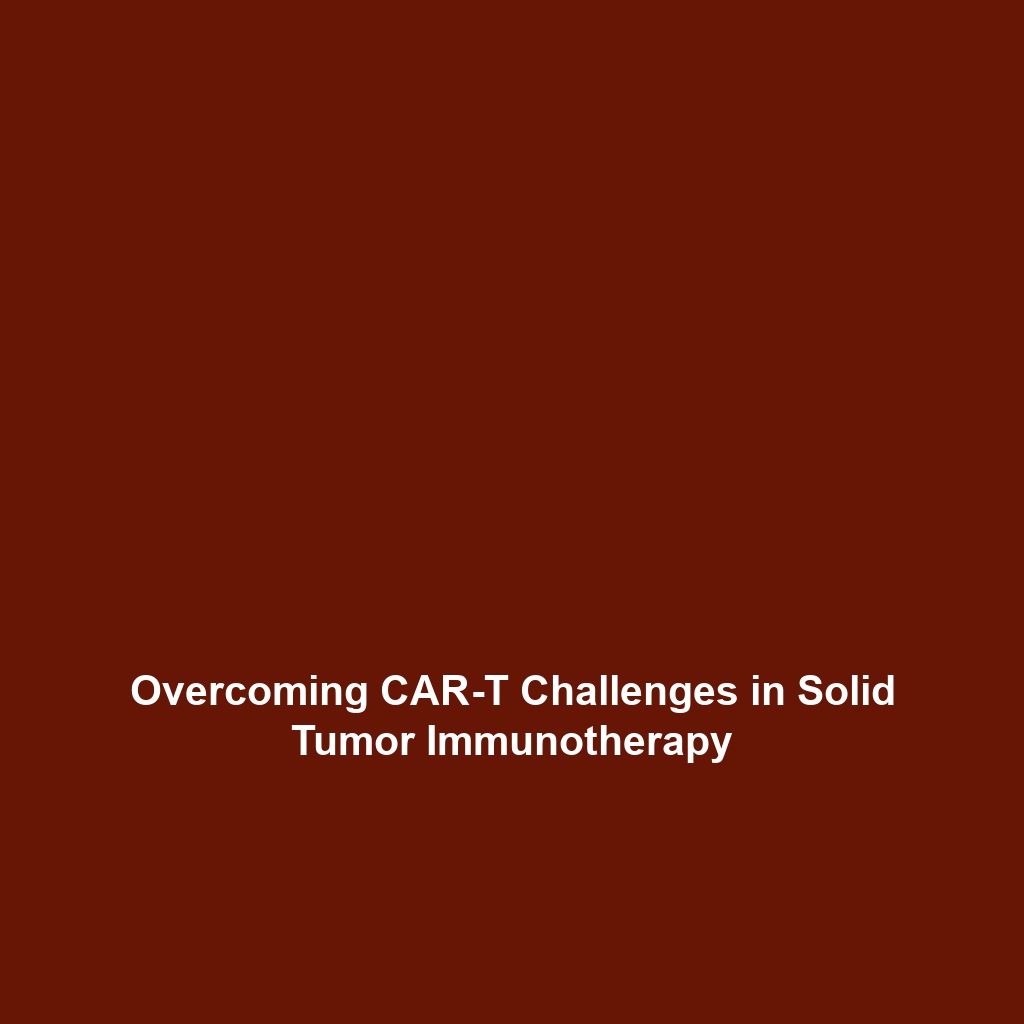Challenges in Using CAR-T for Solid Tumors: Delivery, Toxicity, and Immune Response
Introduction
Chimeric Antigen Receptor T-cell (CAR-T) therapy has revolutionized the treatment of hematologic malignancies but faces significant challenges when applied to solid tumors. As a groundbreaking approach in immunotherapy and cancer, CAR-T therapy’s effectiveness is hampered by issues related to delivery mechanisms, toxicity, and the immune response. Understanding these challenges is crucial for enhancing CAR-T cell therapies and improving patient outcomes in solid tumor treatment.
Key Concepts
Understanding CAR-T Therapy
CAR-T therapy works by genetically modifying a patient’s T-cells to recognize and attack cancer cells. While successful in blood cancers, the challenges in using CAR-T for solid tumors arise from factors such as:
- Delivery: Effective delivery of CAR-T cells to tumor sites is complicated by physical barriers within the tumor microenvironment.
- Toxicity: The systemic effects of CAR-T therapy can result in cytokine release syndrome and neurotoxicity, which are more difficult to manage in solid tumors.
- Immune Response: Solid tumors often evade immune detection and suppression, limiting the efficacy of CAR-T therapies.
Applications and Real-World Uses
Applications of CAR-T therapy in solid tumors have seen limited success; however, research has explored several innovative approaches:
- Combination Therapies: Merging CAR-T therapy with checkpoint inhibitors to enhance immune system activation.
- Targeting Multiple Antigens: Developing CAR-T cells that can recognize multiple tumor-associated antigens to improve specificity and reduce tumor evasion.
- Enhancing Cell Delivery: Utilizing nanotechnology and biomaterials to improve the localization of CAR-T cells to tumor sites.
Current Challenges
The practical application of CAR-T for solid tumors is not without significant challenges:
- Delivery Mechanisms: Overcoming the physical barriers presented by the solid tumor microenvironment remains a key hurdle.
- Managing Toxicity: Toxicity management during CAR-T therapy requires further refinement to ensure patient safety.
- Immune Evasion: Solid tumors often possess immune-suppressive mechanisms that hinder effective therapy.
- Scalability: The complexity and cost of producing CAR-T cells for solid tumor applications presents logistical challenges.
Future Research and Innovations
Ongoing research aims to address the future challenges in CAR-T therapy for solid tumors through innovations such as:
- Next-Generation CARs: Developing CAR-T cells with enhanced targeting capabilities and reduced side effects.
- Self-Expanding CAR-T Cells: Researching modifications that allow CAR-T cells to proliferate once they reach the tumor site.
- Biomarker Development: Identifying biomarkers that can help predict patient response and tailor CAR-T therapies accordingly.
Conclusion
The challenges in utilizing CAR-T therapies for solid tumors—namely, delivery, toxicity, and immune response—remain a focal point in the field of immunotherapy and cancer. Addressing these issues through continued research and innovation could pave the way for more effective treatments, ultimately improving patient outcomes. To learn more about CAR-T therapy and its implications for cancer treatment, consider exploring our related articles on advances in immunotherapy.

Leave a Reply